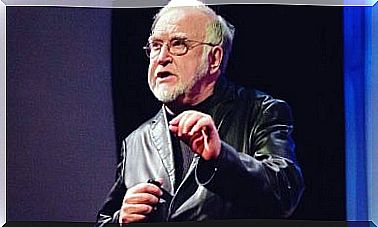What Is Multifocal Intelligence?

Multifocal intelligence is a theory created by Brazilian psychiatrist and psychotherapist Augusto Cury. It talks about how we construct thoughts and the effect this has on our emotional well-being. It is an existential approach, the main objective of which is to learn to manage the mind in a constructive way.
The way we think, including the way we process the information to which we have access, would have a decisive influence on how we position ourselves in the world. From this, we would develop attitudes and behaviors.
Thus, if we use multifocal intelligence correctly, we will be able to manage the production of thoughts correctly. This will be reflected in more constructive attitudes and behaviors directed towards more positive goals for ourselves.

Multifocal intelligence
Multifocal intelligence is defined as the result of the psychodynamic structures found in the mind. In other words, there is a series of processes that take place in our brain. The way of establishing relationships generates what is called intelligence, from the point of view of multifocal theory.
The processes that take place within the framework of multifocal intelligence are four in number:
- Construction of thought
- Transformation of psychic energy
- Self-training
- Organization of memory, based on conscious and unconscious history
The being, or the I, is the entity that directs and administers all of these processes. In other words, they can all navigate consciously. The theory suggests that this can be achieved by performing a critical analysis. This allows you to see the facts from different points of view. In addition, it helps to give new meaning to everything that negatively impacts us.
The foundations of the theory
The theory of multifocal intelligence is based on philosophy and existential psychology, just like archetypal psychoanalysis. It is a perspective that in a way seeks to help logical thinking. From there it is possible to analyze how some thoughts appear in reaction to others, like a chain. According to this conception, what is positive is that we could intervene on a link in this chain, to then generate inertia.
What the theory proposes is to question, challenge, and criticize all disruptive thoughts that come into our mind. These are the fruit of an emotional, conscious and unconscious story. According to this approach, distressing thoughts and anticipatory suffering only need 5 seconds to leave a mark in our brain.
Said mark remains in the cerebral cortex and opens a “window”, or in other words, a destructive perspective. Take the example of a public presentation. If we think it’s going to go wrong. 5 seconds will be enough for a perspective to emerge in which we will foresee a series of negative situations. This will thus generate destructive emotions in parallel.
If we put in place rational thinking in the face of this scenario, the theory asserts that we will succeed in avoiding the opening of this “window”. She also anticipates that, with time and practice, we will become sufficiently trained to prevent negative thinking per se, which would cause the rest. This is precisely the goal of multifocal intelligence.

The work of multifocal intelligence
Augusto Cury offers different actions to make multifocal intelligence work. These are related to stopping for a few moments and realizing the thoughts that motivate our actions. This is called “management” or “administration” of thought. The following actions are recommended:
- Short-term relaxation: it is necessary to take a few minutes to relax the mind, several times a day. So, take a few minutes to breathe and think about the constructive meaning of what we are doing.
- Emphasize positive stimuli: this means working the attention so that it focuses mainly on the positive things that we receive from our environment, on a daily basis
- Get good rest: sleep should never be cut off under any circumstances. In addition, it is important to establish a clear division between working time and rest time. The latter is sacred
- Control anticipatory reasoning: be attentive to ideas that anticipate the future in an imaginary way. The future is there to offer us goals or projects, not to imagine situations. In this case, the ideal is to block the imagination
- Take an interest in the quality of reasoning. Pay attention to the emergence of disruptive thoughts and analyze them critically
All of this is a way of educating reasoning, and at the same time, of transforming destructive emotions. In time, according to this theory, all of this should lead to a smarter, more peaceful, peaceful and constructive life.









